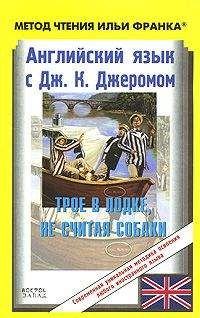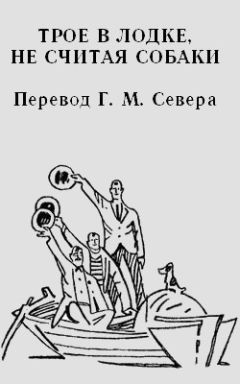Jerome Jerome - Английский язык с Джеромом К. Джеромом. Трое в лодке, не считая собаки
impartial [ɪmˈpɑ:ʃ(ǝ)l] canine [ˈkeɪnaɪn] hearth [hɑ:Ɵ]
The result of his first experiment seemed highly satisfactory to him, and he determined to go on and make things lively all round. He sprang over the poodle and vigorously attacked a collie, and the collie woke up, and immediately commenced a fierce and noisy contest with the poodle. Then Foxey came back to his own place, and caught the bull-dog by the ear, and tried to throw him away; and the bull-dog, a curiously impartial animal, went for everything he could reach, including the hall-porter, which gave that dear little terrier the opportunity to enjoy an uninterrupted fight of his own with an equally willing Yorkshire tyke.
Anyone who knows canine nature need hardly be told that, by this time, all the other dogs in the place were fighting as if their hearths and homes depended on the fray. The big dogs fought each other indiscriminately; and the little dogs fought among themselves, and filled up their spare time by biting the legs of the big dogs.
The whole lobby was a perfect pandemonium, and the din was terrific (весь вестибюль стал настоящим адом, и шум был ужасающим; perfect — совершенный, идеальный; полный, точный; pandemonium — ад, обитель демонов; столпотворение). A crowd assembled outside in the Haymarket, and asked if it was a vestry meeting (толпа собралась снаружи в Хэймаркете, и /все/ спрашивали, не заседание ли это приходского управления; vestry — собрание прихожан-членов церковной общины; заседание приходского управления или церковного совета; meeting — заседание, митинг, собрание); or, if not, who was being murdered, and why (или, если нет, то кого убивают и почему)? Men came with poles and ropes, and tried to separate the dogs, and the police were sent for (пришли люди с шестами и веревками и попытались растащить собак, послали за полицией; to separate — отделять, разъединять, разводить; to send).
And in the midst of the riot that sweet young lady returned (и среди потасовки вернулась милая барышня; riot — бунт, восстание, мятеж; дебош), and snatched up that sweet little dog of hers (и подхватила своего дорогого милого песика) (he had laid the tyke up for a month, and had on the expression, now, of a new-born lamb) into her arms (он вывел дворнягу из строя на месяц и теперь принял вид новорожденного ягненка; to lay up; to have on — быть одетым в), and kissed him, and asked him if he was killed, and what those great nasty brutes of dogs had been doing to him (и поцеловала его, и спросила, не убит ли он, и что эти большие мерзкие грубые собаки сделали ему; brute — животное; жестокий грубый человек, скотина); and he nestled up against her, and gazed up into her face with a look that seemed to say (а он прильнул к ней и посмотрел ей в лицо с таким видом, который словно говорил; to gaze — пристально смотреть, вглядываться): "Oh, I'm so glad you've come to take me away from this disgraceful scene (я так рад, что вы пришли, чтобы унести меня из этого постыдного места)!"
pandemonium [,pændɪˈmǝunɪǝm] lamb [læm] nestled [nesld]
The whole lobby was a perfect pandemonium, and the din was terrific. A crowd assembled outside in the Haymarket, and asked if it was a vestry meeting; or, if not, who was being murdered, and why? Men came with poles and ropes, and tried to separate the dogs, and the police were sent for.
And in the midst of the riot that sweet young lady returned, and snatched up that sweet little dog of hers (he had laid the tyke up for a month, and had on the expression, now, of a new-born lamb) into her arms, and kissed him, and asked him if he was killed, and what those great nasty brutes of dogs had been doing to him; and he nestled up against her, and gazed up into her face with a look that seemed to say: "Oh, I'm so glad you've come to take me away from this disgraceful scene!"
She said that the people at the Stores had no right to allow great savage things like those other dogs to be put with respectable people's dogs (она сказала, что хозяева магазина не имеют права разрешать оставлять больших свирепых животных вроде этих /других/ собак вместе с собаками порядочных людей; to allow — позволять, разрешать), and that she had a great mind to summon somebody (и что она намеревается вызвать кое-кого в суд; to have a great mind — быть склонным /сделать что-либо/).
Such is the nature of fox-terriers (такова природа фокстерьеров); and, therefore, I do not blame Montmorency for his tendency to row with cats (и поэтому я не осуждаю Монморенси за его склонность ссориться с кошками; to row — скандалить, шуметь; затевать драку); but he wished he had not given way to it that morning (но он /сам/ жалеет, что поддался ей /склонности/ в то утро: «желает, чтобы он не поддавался…»; to give way to).
We were, as I have said, returning from a dip (мы, как я уже сказал, возвращались с купанья), and half-way up the High Street a cat darted out from one of the houses in front of us (и /когда мы были/ на середине главной улице, кот выскочил из одного из домов впереди нас; half-way — лежащий на полпути; посередине; to dart — бросать, метать; рвануться, кинуться), and began to trot across the road (и побежал через дорогу; to trot — идти рысью; спешить, торопиться). Montmorency gave a cry of joy — the cry of a stern warrior who sees his enemy given over to his hands (Монморенси издал радостный крик — крик сурового воина, который видит, что враг попал к нему в руки; to give over — передавать, выдавать) — the sort of cry Cromwell might have uttered when the Scots came down the hill — and flew after his prey (такой крик, должно быть, испустил Кромвель, когда шотландцы спустились с холма, — и полетел за своей добычей; to utter — издавать, произносить; to fly).
darted [ˈdɑ:tɪd] enemy [ˈenǝmɪ]
She said that the people at the Stores had no right to allow great savage things like those other dogs to be put with respectable people's dogs, and that she had a great mind to summon somebody.
Such is the nature of fox-terriers; and, therefore, I do not blame Montmorency for his tendency to row with cats; but he wished he had not given way to it that morning.
We were, as I have said, returning from a dip, and half-way up the High Street a cat darted out from one of the houses in front of us, and began to trot across the road. Montmorency gave a cry of joy — the cry of a stern warrior who sees his enemy given over to his hands — the sort of cry Cromwell might have uttered when the Scots came down the hill — and flew after his prey.
His victim was a large black Tom (его жертвой был большой черный кот; tom — самец различных животных и птиц /tom turkey — индюк; tom cat — кот и т.д./). I never saw a larger cat, nor a more disreputable-looking cat (никогда не видел более огромного и отвратно выглядящего кота; disreputable — недостойный уважения, позорный; пользующийся дурной славой). It had lost half its tail, one of its ears (он потерял половину хвоста, одно ухо), and a fairly appreciable proportion of its nose (и довольно значительную часть носа; proportion — пропорция; доля, часть). It was a long, sinewy-looking animal (это было длинное, мускулистое животное; sinewy — мускулистый, жилистый). It had a calm, contented air about it (у него был спокойный, довольный вид).
Montmorency went for that poor cat at the rate of twenty miles an hour (Монморенси приближался к этому бедному коту со скоростью двадцать миль в час; to go for — идти за /чем-либо/; стремиться; нападать, набрасываться); but the cat did not hurry up — did not seem to have grasped the idea that its life was in danger (но кот не торопился — казалось, он не схватил мысль = не понимал, что его жизнь в опасности). It trotted quietly on until its would-be assassin was within a yard of it (он продолжал спокойно идти рысцой, пока его потенциальный/вероятный убийца не оказался в ярде от него), and then it turned round and sat down in the middle of the road (и тогда он повернулся и сел посреди дороги), and looked at Montmorency with a gentle, inquiring expression, that said (и посмотрел на Монморенси с легким вопрошающим выражением, которое говорило):
"Yes! You want me (вам нужен я/чем могу помочь)?"
Montmorency does not lack pluck (не испытывает недостатка в смелости; pluck — рывок; ливер; смелость, отвага); but there was something about the look of that cat that might have chilled the heart of the boldest dog (но во внешности этого кота было что-то такое, что могло бы остудить мужество самого бесстрашного пса; heart — сердце; душа; отвага, мужество). He stopped abruptly, and looked back at Tom (он резко остановился и тоже посмотрел на кота).
sinewy [ˈsɪnju:ɪ] assassin [ǝˈsæsɪn]
His victim was a large black Tom. I never saw a larger cat, nor a more disreputable-looking cat. It had lost half its tail, one of its ears, and a fairly appreciable proportion of its nose. It was a long, sinewy-looking animal. It had a calm, contented air about it.
Montmorency went for that poor cat at the rate of twenty miles an hour; but the cat did not hurry up — did not seem to have grasped the idea that its life was in danger. It trotted quietly on until its would-be assassin was within a yard of it, and then it turned round and sat down in the middle of the road, and looked at Montmorency with a gentle, inquiring expression, that said:
"Yes! You want me?"
Montmorency does not lack pluck; but there was something about the look of that cat that might have chilled the heart of the boldest dog. He stopped abruptly, and looked back at Tom.
Neither spoke (ни тот, ни другой /ничего/ не говорил); but the conversation that one could imagine was clearly as follows (но разговор, который можно было представить, был, очевидно, таким; as follows — следующее, как указано далее):—
THE CAT: "Can I do anything for you (могу я что-нибудь сделать для вас)?"
MONTMORENCY: "No — no, thanks (нет, спасибо)."
THE CAT: "Don't you mind speaking, if you really want anything, you know (не стесняйтесь, говорите, если вам действительно что-нибудь нужно)."
MONTMORENCY (backing down the High Street) (отступая по главной улице): "Oh, no — not at all — certainly — don't you trouble (о нет, вовсе нет, конечно, не беспокойтесь). I — I am afraid I've made a mistake (я… боюсь, я допустил ошибку). I thought I knew you (мне показалось, что я вас знаю). Sorry I disturbed you (простите, что побеспокоил)."
THE CAT: "Not at all — quite a pleasure (вовсе нет — рад служить; pleasure — удовольствие, наслаждение). Sure you don't want anything, now (уверены, что вам ничего не нужно)?"
Neither spoke; but the conversation that one could imagine was clearly as follows:—
THE CAT: "Can I do anything for you?"
MONTMORENCY: "No — no, thanks."
THE CAT: "Don't you mind speaking, if you really want anything, you know."
MONTMORENCY (backing down the High Street): "Oh, no — not at all — certainly — don't you trouble. I — I am afraid I've made a mistake. I thought I knew you. Sorry I disturbed you."
THE CAT: "Not at all — quite a pleasure. Sure you don't want anything, now?"
MONTMORENCY (still backing) (по-прежнему отступая): "Not at all, thanks — not at all — very kind of you (ничего, спасибо, очень любезно с вашей стороны). Good morning (всего доброго; good morning — доброе утро; здравия желаю)."



